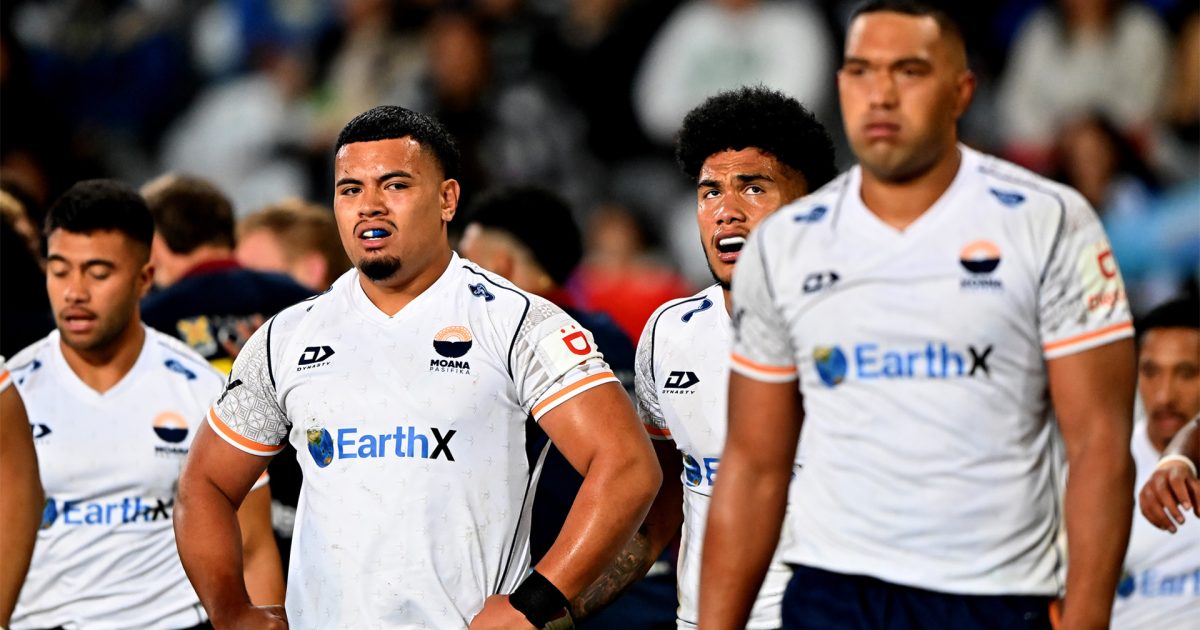Aaron Mauger will eventually lose patience with Moana Pasifika's ill-discipline

Moana Pasifika have defied expectations so far this year but there’s one simple area of the game that’s letting them down: their discipline.
You could forgive the new boys of Super Rugby for not being as fit as their opposition, as well-drilled or as astute at game management, or even simply not as talented. It’s going to take some time for Moana Pasifika to get up to the same level as the teams who have been playing Super Rugby for years and years and being a little behind the eight-ball is frankly better than what should have been expected of the Pacific Islanders in their first year of competition.
But what’s made for frustrating viewing (and undoubtedly even more so for coach Aaron Mauger) is seeing Moana Pasifika hand their opposition possession and territory through ill-discipline -when it’s such an easy thing to get right.
Following almost every game that Moana Pasifika have played, Mauger has acknowledged that discipline has let the team down. He’s also been quick to point out that some of those mistakes come down to not necessarily being up to speed with the pace of the game at Super Rugby level.
“It’s a massive one for us, learning the pace of the game,” he said following the latest loss at the hands of the Highlanders. “Some of our boys are coming out of pretty much club rugby last year, or had a handful of Heartland or NPC games.”
View this post on Instagram
That means when professional referees get involved, less experienced players are more likely to cop penalties for things like not rolling away from contact quick enough. It’s not just understandable infractions such as that which have been a key component of Moana Pasifika’s game this year, however.
Time and time again, players are getting pinged for late or high tackles or simply not retreating to the offside line – something which Mauger noted following Friday evening’s 20-point loss in Dunedin.
“[There were] a couple of technical [penalties] for us and then a couple of dumb ones: a couple of late shots put us under pressure, especially early on, which was a bit disappointing and obviously created the Highlanders’ first opportunity to score. Thought we played some really good footy other than that. Good lesson around that.”
It’s hard to truly gauge what the lesson will be for Moana Pasifika, however, because they’ve evidently not learned from their previous five encounters.
Mauger also noted that his men were well and truly prepared for the Highlanders to go to their lineout drive to accumulate penalties and points so it begs the question why Moana Pasifika were so quick to hand their opposition countless opportunities to do just that.
“We knew the Highlanders were gonna be strong around the set-piece,” Mauger said following the match. “They’ve been outstanding there all year. It’s been a real strength of theirs and they’ve gone to the maul and used their scrum really well. We knew that was gonna be a challenge.
“But I thought we actually fronted up reasonably well there. Just a couple of technical things that [would have] helped us stay in there a little bit longer and keep them out even more. Because they did well, the Highlanders, to execute the three they did get, and that ultimately was the difference.”
Moana Pasifika don’t necessarily have the cattle to stand up to the bigger teams at set-piece time and that’s not any fault of their own, but the obvious way of mitigating that weakness is by not gifting teams the chance to use the set-piece as a weapon.
You can’t simply wave your hand and expect knock-ons to disappear and kicks to not sail into touch, but conceding needless penalties is simply going to put your team under duress. If you’re not able to bring a maul down legally (or at least in a way that the referee isn’t going to ping you for), then you shouldn’t be constantly swimming up the sides and taking out the legs of opposition players or you will simply add to the misery and end up having to play with a disadvantage in numbers. Twice Moana Pasifika lost players to the bin in Friday’s defeat and neither of those were a result of simply not being up to the same standard as their opposition.
Moana Pasifika have shown that when they’re able to keep their discipline in check, they’re able to match it with the best teams in this competition. Unfortunately for Aaron Mauger, his inexperienced side have rarely shown that much composure to really put their opposition under pressure. Time and time again the head coach has lamented his team’s ill-discipline but it’s beginning to look like the issue is nothing to do with inexperience or not being up to the pace of matches and instead it’s simply down to players lacking the mentality needed to play rugby at the highest level of the game.











































































